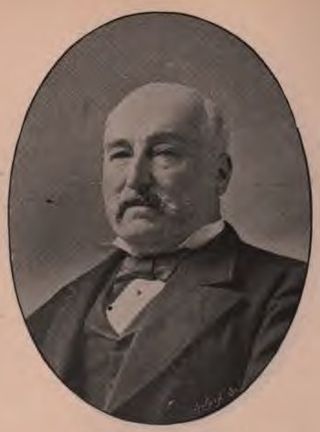Related Research Articles

Sunderland is a port city in Tyne and Wear, England. It is the City of Sunderland's administrative centre and in the historic county of Durham. The city is 10 miles (16 km) from Newcastle-upon-Tyne and is on the River Wear's mouth to the North Sea. The river also flows through Durham roughly 12 miles (19 km) south-west of Sunderland City Centre. It is the only other city in the county and the second largest settlement in the North East after Newcastle upon Tyne.

The City of Sunderland is a metropolitan borough with city status in the metropolitan county of Tyne and Wear, North East England. It is named after its largest settlement, Sunderland, spanning a far larger area, including nearby towns including Washington, Hetton-le-Hole and Houghton-le-Spring, as well as the surrounding suburban villages. The district also forms a large majority of Wearside which includes Chester-le-Street in County Durham.
Edward Backhouse (1808–1879) was a Quaker philanthropist and writer on church history. He was also one of the founding fathers of the Sunderland Echo newspaper. He was recognised as having the gift of vocal ministry in 1854.

Sir Charles Mark Palmer, 1st Baronet was an English shipbuilder born in South Shields, County Durham, England. He was also a Liberal Party politician and Member of Parliament. His father, originally the captain of a whaler, moved in 1828 to Newcastle upon Tyne, where he owned a ship owning and ship-broking business.

The Sunderland Echo is a daily newspaper serving the Sunderland, South Tyneside and East Durham areas of North East England. The newspaper was founded by Samuel Storey, Edward Backhouse, Edward Temperley Gourley, Charles Palmer, Richard Ruddock, Thomas Glaholm and Thomas Scott Turnbull in 1873, as the Sunderland Daily Echo and Shipping Gazette. Designed to provide a platform for the Radical views held by Storey and his partners, it was also Sunderland's first local daily paper.
Samuel Storey (1841–1925) was a British politician born in County Durham. He became a Member of Parliament for Sunderland and the main founder of the Sunderland Echo newspaper.
Thomas Scott Turnbull was the son of a Newcastle saddler. He went on to open one of the largest drapery houses in Northeast England, was a founder member of a daily provincial newspaper and served as Mayor of Sunderland.
Lancelot Nixon Richard Ruddock (1837-1908) - known as Richard Ruddock - was a reporter, newspaper editor and a founder of the Sunderland Echo in the 19th century.
Sir Edward Temperley Gourley was a coal fitter, shipowner, and politician born in Sunderland, England. He was knighted for his political work.

George Edward Anderson, sometimes known as Teddy Anderson, was an English professional football outside left who played in the Football League for Birmingham. He also played in the Southern League for Brentford.

Charles Hodgson Fowler was a prolific English ecclesiastical architect who specialised in building and, especially, restoring churches.
The 2003 Sunderland Council election took place on 1 May 2003 to elect members of Sunderland Metropolitan Borough Council in Tyne and Wear, England. One third of the council was up for election and the Labour Party stayed in overall control of the council.

In 685, King Ecgfrith granted Benedict Biscop a "sunder-land". Also in 685 The Venerable Bede moved to the newly founded Jarrow monastery. He had started his monastic career at Monkwearmouth monastery and later wrote that he was "ácenned on sundorlande þæs ylcan mynstres". This can be taken as "sundorlande" or the settlement of Sunderland. Alternatively, it is possible that Sunderland was later named in honour of Bede's connections to the area by people familiar with this statement of his.
Joseph William Robson was an English footballer who made 148 appearances in the Football League playing for South Shields, Southend United, Durham City, Rochdale and Lincoln City. He played at centre half, left half or left back.
John Stapylton Grey Pemberton was Member of Parliament for Sunderland 1900–1906 and Vice-Chancellor of Durham University 1918–1919. He was also President of the Council of Durham Colleges 1911–1937, Recorder for Durham and chair of the Durham Quarter Sessions. He died in 1940 aged 79.
Charles Reed was an English footballer who played as a left back in the Football League for Barnsley and Clapton Orient and in non-league football for Sunderland West End, Darlington and Sunderland Rovers.

John Storey Barwick, 1st Baronet of Ashbrooke Grange, J.P., (1840–1915), was an English industrialist involved within quarries, coal-mining, shipping and shipbuilding concerns. He was founder of Easington Colliery in 1899 then known as The Easington Coal Company Limited a privately owned company of which he was chairman. Barwick was made first baronet of Ashbrooke Grange in 1912.

Palatine Lodge No. 97 is a Craft Masonic Lodge in Freemasonry under the jurisdiction of the United Grand Lodge of England. The Lodge meets at Wearside Masonic Temple, Burdon Road, Sunderland and has done so since 1932. Previously the Lodge met at the Masonic Hall in Park Terrace, which was dismantled in 1988, rebuilt and opened in April 2000 at the Beamish Open Air Museum, Stanley, County Durham, England.
Bryan Abbs (1771–1850) was an English landowner and magistrate for County Durham. He was involved in promoting the construction of the north dock at South Shields, and property development south of the River Tyne.
References
- ↑ Amber onlinewebsite (2007). "Thomas's father's details" . Retrieved 24 February 2008.
- ↑ Sunderland Daily Echo and Daily Post: March 16, 1888
- ↑ Sunderland Daily Echo and Daily Post: March 19, 1888
- ↑ Sunderland Daily Echo, March 23, 1880
- ↑ Wearsideonline website (2007). "Sunderland Echo". Archived from the original on 9 May 2008. Retrieved 24 February 2008.
- ↑ Memberscox website (2007). "Founding member". Archived from the original on 25 May 2011. Retrieved 24 February 2008.
- ↑ Sunderland Daily Echo and Daily Post: March 16, 1888
- ↑ Sunderland Times: July 21, 1874
- ↑ Sunderland Daily Echo and Daily Post: March 16, 1888
- ↑ Sunderland Daily Echo and Daily Post: March 19, 1888